
|
Astronomy Picture Of the Day (APOD)
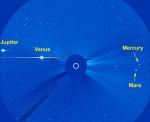 Children of the Sun
Children of the Sun
16.11.2006
For a moment, planets Jupiter, Venus, Mars, and Mercury all posed near their parent star in this Sun-centered view, recorded on November 11. The picture, from a coronograph onboard the space-based SOlar Heliospheric Observatory, spans 15 degrees with the Sun's size and position indicated by the white circle.
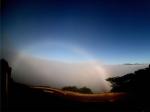 A Fog Bow Over California
A Fog Bow Over California
15.11.2006
Is that white arch real? What is being seen is a fogbow, a reflection of sunlight by water drops similar to a rainbow but without the colors. The fog itself is not confined to an arch -- the fog is mostly transparent but relatively uniform.
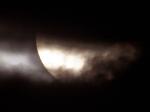 Mercurys Transit: An Unusual Spot on the Sun
Mercurys Transit: An Unusual Spot on the Sun
14.11.2006
What's that dot on the Sun? If you look closely, it is almost perfectly round. The dot is the result of an unusual type of solar eclipse that occurred last week. Usually it is the Earth's Moon that eclipses the Sun.
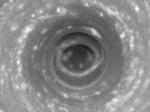 A Hurricane Over the South Pole of Saturn
A Hurricane Over the South Pole of Saturn
13.11.2006
What's happening at the south pole of Saturn? To find out, scientists sent the robot Cassini probe now orbiting Saturn directly over the lower spin axis of the ringed giant. Cassini found there a spectacular massive swirling storm system with a well developed eye-wall, similar to a hurricane here on Earth.
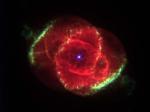 The Cats Eye Nebula
The Cats Eye Nebula
12.11.2006
Three thousand light-years away, a dying star throws off shells of glowing gas. This image from the Hubble Space Telescope reveals the Cat's Eye Nebula to be one of the most complex planetary nebulae known.
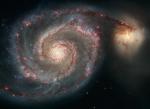 M51: Cosmic Whirlpool
M51: Cosmic Whirlpool
11.11.2006
Follow the handle of the Big Dipper away from the dipper's bowl, until you get to the handle's last bright star. Then, just slide your telescope a little south and west and you might find this stunning pair of interacting galaxies, the 51st entry in Charles Messier's famous catalog.
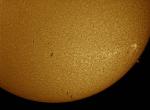 Mercury and the Chromosphere
Mercury and the Chromosphere
10.11.2006
Enjoying Wednesday's transit of Mercury from Dallas, Texas, astronomer Phil Jones recorded this detailed image of the Sun. Along with a silhouette of the innermost planet, a network of cells and dark filaments can be seen against a bright solar disk with spicules and prominences along the Sun's edge.
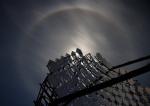 Halo and Hexagons
Halo and Hexagons
9.11.2006
As a bright November Moon lit up the night sky last week, Gil Esquerdo spotted this lovely Moon halo overhead at the Whipple Observatory on Mt. Hopkins, Arizona. In the foreground, the structure...
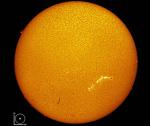 Simulated Transit of Mercury
Simulated Transit of Mercury
8.11.2006
Mercury, the solar system's innermost planet, will spend about five hours crossing in front of the Sun today - beginning at 1912 UT (2:12pm EST), November 8. Specially equipped telescopes are highly recommended...
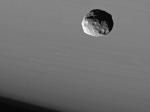 Janus: Potato Shaped Moon of Saturn
Janus: Potato Shaped Moon of Saturn
7.11.2006
Janus is one of the stranger moons of Saturn. First, Janus travels in an unusual orbit around Saturn where it periodically trades places with its sister moon Epimetheus, which typically orbits about 50 kilometers away. Janus, although slightly larger than Epimetheus, is potato-shaped and has a largest diameter of about 190 kilometers.
|
January February March April May June July August September October November December |
|||||||||||||||||||||||||||||||||||||||||||||||||